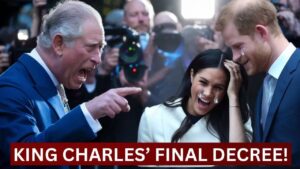In a dramatic turn of events, King Charles has finally taken a definitive stand in the ongoing saga involving his son, Prince Harry, and the Hollywood lifestyle he has embraced.
This pivotal moment comes amidst the release of a revealing German documentary titled “Harry, the Lost Prince,” which paints a stark picture of the once-beloved royal now adrift in the celebrity world of Montecito.
As fans of the monarchy tune in, it seems the narrative has shifted, showcasing a family dynamic that has become increasingly strained.
The documentary, while not unveiling anything new, compiles familiar themes of Harry’s struggles with identity and purpose.
It highlights the failed attempts at rebranding himself, the desperate bids for attention, and the troubling disconnect between their philanthropic claims and reality.
The juxtap of Harry and Meghan’s lavish lifestyles against the backdrop of their supposed charitable missions is strikingly tone-deaf, raising eyebrows and questions about their genuine commitment to the causes they promote.
Once known for his heartfelt charity work, such as founding the Invictus Games, Harry now appears as a mere shadow of his former self, often relegated to the role of a follower, trailing behind Meghan as they navigate their new Hollywood existence.
This reliance on royal connections and revelations to maintain relevance is becoming increasingly evident, leaving many to wonder what the future holds for the couple and their public image.
Ulrika Grunewald, the documentary’s creator, aptly summarizes the Sussexes’ predicament: their actions fail to match their promises.
This sentiment resonates deeply, as viewers reflect on the couple’s transition from royals to self-proclaimed global philanthropists.
The stark contrast between their public persona and private realities has not gone unnoticed, leaving many skeptical of their intentions.
Amidst this turmoil, King Charles’s decision to draw a line in the sand seems both timely and necessary.
After years of extending olive branches, watching his son be paraded as a puppet in a media circus must have taken its toll.
The King’s choice to finally close the door on this chapter signals a shift towards protecting the monarchy’s integrity, allowing the working royals to focus on their duties without the looming specter of Harry and Meghan’s next move.
As the dust settles, one can’t help but feel sympathy for the late Queen Elizabeth II.
She dedicated her life to service, and witnessing her grandson’s current trajectory would surely have been heartbreaking.
The contrasting paths of her two grandsons—William, who embodies royal duty, and Harry, who seems to be losing his way—highlight the challenges facing the institution today.
Catherine, Princess of Wales, exemplifies how to embrace royal life with grace and dedication.
Coming from a similar background as Meghan, Catherine has managed to adapt to her role without attempting to overhaul centuries of tradition.
Her steady approach stands in stark contrast to Meghan’s more tumultuous journey, which has often sought immediate recognition and change.
Looking ahead, the documentary poses critical questions about Harry and Meghan’s future.
Without their royal ties, what remains of their brand?
Once celebrated as royal rebels, their story is beginning to lose its luster.
As they grapple with their identity outside the royal fold, the question arises: will they find a way to remain relevant, or are they destined to fade into obscurity?
The film also touches upon the couple’s apparent isolation in both the UK and Hollywood.
Their lack of genuine friendships raises eyebrows, suggesting that the bonds they forged may have been more transactional than authentic.
Even family ties seem to be fraying, with reports of Princess Eugenie distancing herself, leaving the Sussexes increasingly alone in their pursuits.
As the conversation shifts to their children, Archie and Lilibet, one can’t help but feel a sense of loss for what they will miss growing up away from their royal heritage.
The traditions and values that should be part of their birthright are overshadowed by their parents’ choices, creating a poignant narrative of lost opportunities.
King Charles’s firm stance reflects a broader need for the monarchy to adapt while maintaining its core values of service and duty.
The decision to cut ties may ultimately serve to strengthen the institution, allowing it to evolve without the distractions of scandal.
As younger generations begin to reassess their views on the Sussexes, it’s clear that the tide is turning.
In this complex royal drama, the title of the documentary, “The Lost Prince,” resonates deeply.
Harry’s journey from a beloved royal to a figure struggling for relevance encapsulates a tragic narrative.
As the monarchy navigates these turbulent waters, one thing remains clear: the essence of royalty lies in service, not sensationalism.
The future may hold uncertainty, but the institution itself is built to endure, standing firm through the trials of time.
